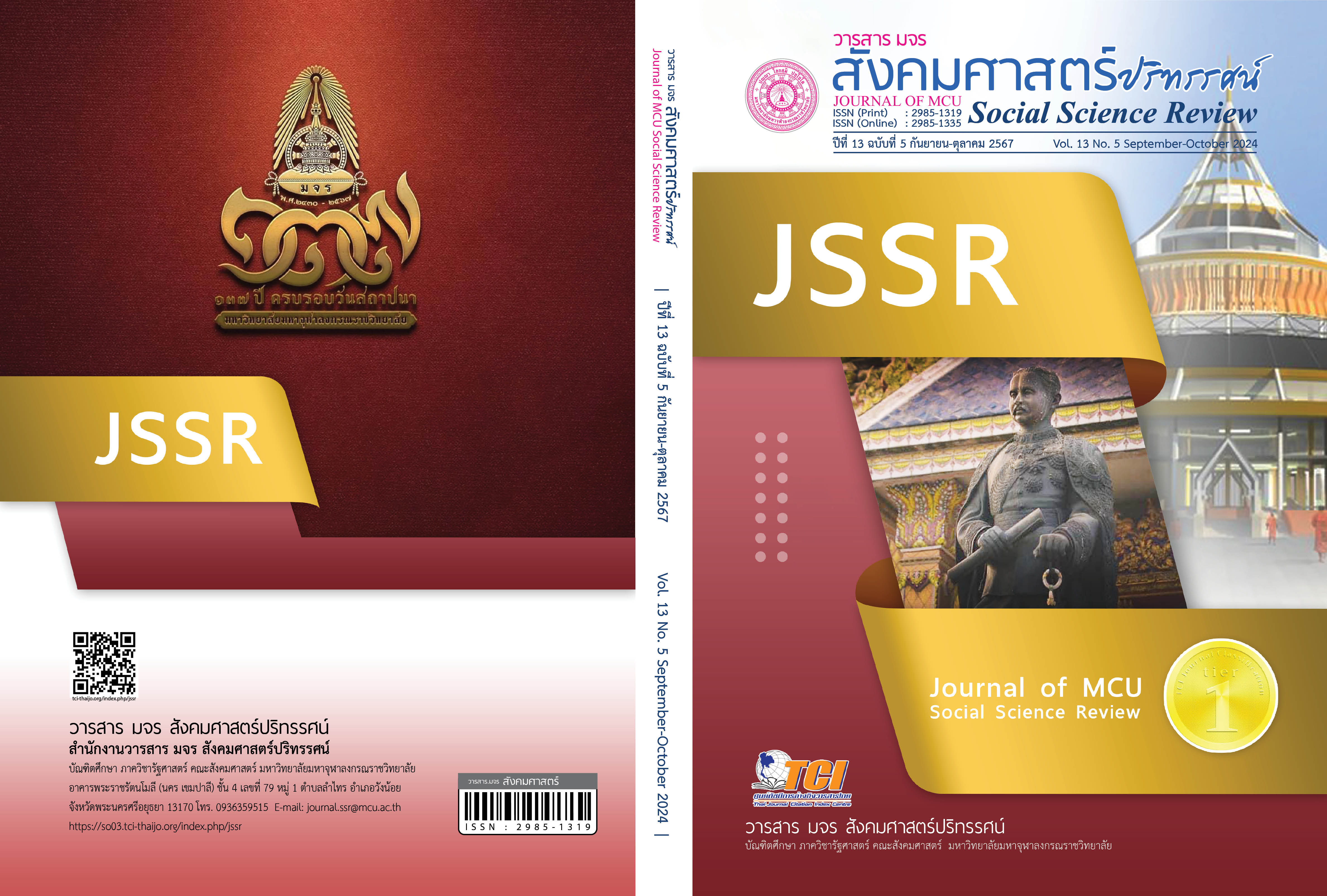การพัฒนารูปแบบการดำเนินธุรกิจเพื่อสังคมอย่างยั่งยืน
คำสำคัญ:
การสร้างคุณค่าร่วม, วิสาหกิจเพื่อสังคม, ธุรกิจเพื่อสังคมอย่างยั่งยืนบทคัดย่อ
บทความวิจัยนี้มีเพื่อพัฒนารูปแบบการดำเนินกิจการเพื่อตอบแทนสังคมอย่างยั่งยืน เป็นการวิจัยเชิงคุณภาพที่เน้นการสัมภาษณ์ การศึกษาข้อมูลจากเอกสาร บทความ วารสาร และงานวิจัยที่เกี่ยวข้อง พร้อมทั้งการสัมภาษณ์เชิงลึกกลุ่มตัวอย่างผู้ให้ข้อมูลสำคัญ ได้แก่ ผู้ประกอบการธุรกิจ ผู้นำและสมาชิกชุมชน นักวิชาการด้านธุรกิจเพื่อสังคม โดยมุ่งบูรณาการแนวคิดด้านความรับผิดชอบต่อสังคมของกิจการ การสร้างคุณค่าร่วม และวิสาหกิจเพื่อสังคม
ผลการวิจัยพบว่า การพัฒนารูปแบบการดำเนินธุรกิจเพื่อสังคมอย่างยั่งยืน มีกลไก 4 ด้าน ได้แก่ 1. สินทรัพย์ขององค์กร คือ กระบวนการบริหารจัดการเงินทุนอย่างมีประสิทธิภาพ การบริหารจัดการเชิงกลยุทธ์แบบองค์รวม การจัดสรรเครื่องมือหรืออุปกรณ์ที่จำเป็นการส่งเสริมพัฒนาบุคลากรให้ก้าวทันการเปลี่ยนแปลงของธุรกิจและสังคม 2. ความต้องการของสังคมโดยยกระดับการมีส่วนร่วมของชุมชนและสังคม การเปิดโอกาสให้ชุมชนเข้ามามีบทบาทและความผูกพันในการดำเนินธุรกิจตั้งแต่เริ่มต้นเพื่อวางแผน กำหนดเป้าหมาย และมีอำนาจในการตัดสินใจ 3. มูลค่าทางธุรกิจ กระบวนการสำคัญที่จะช่วยขับเคลื่อนองค์กรไปสู่การดำเนินธุรกิจเพื่อสังคมอย่างยั่งยืน ได้แก่ การบริหารจัดการสิ่งแวดล้อม (Environment) สังคม (Social) และธรรมาภิบาล (Governance) 4. ความยั่งยืนของสังคมโดยคำนึงถึงการส่งเสริมความยั่งยืนของการดำเนินธุรกิจใน 4 มิติ ได้แก่ เศรษฐกิจ สังคม วัฒนธรรมและการเมืองที่สอดคล้องกับกรอบการดำเนินงานตามเป้าหมายการพัฒนาที่ยั่งยืน (Sustainable Development Goals: SDGs)
เอกสารอ้างอิง
กาญจนา เหล่าโชคชัยกุล และคณะ. (2562). กิจการเพื่อสังคมเพื่อการพัฒนา. วารสารบัณฑิตศึกษาปริทรรศน์ วิทยาลัยสงฆ์นครสวรรค์, 7(3), 251-262.
เกศินี ประทุมสุวรรณ และพีรพัฒน์ พันศิริ. (2564). วิสาหกิจเพื่อสังคมบนฐานทุนวัฒนธรรมเพื่อการพัฒนาที่ยั่งยืน. วารสารวิชาการ มหาวิทยาลัยหอการค้าไทย, 41(3), 88-101.
จิตติ มงคลชัยอรัญญา. (2559). CSR กับ การพัฒนาประเทศ. วารสารสังคมศาสตร์และมนุษยศาสตร์, 42(1), 1-27.
ธนกฤต วงศ์มหาเศรษฐ. (2562). แนวทางการจัดการการสร้างคุณค่าร่วมในภาคธุรกิจอุตสาหกรรม. วารสารวิชาการบริหารธุรกิจ สมาคมสถาบันอุดมศึกษาเอกชนแห่งประเทศไทย ในพระราชูปถัมภ์สมเด็จพระเทพรัตนราชสุดาฯ สยามบรมราชกุมารี, 9(1), 134-153.
ปนัดดา ตันตระกูล และกรรณิการ์ อัศวดรเดชา. (2553). ประสิทธิผลของการใช้แนวคิดความรับผิดชอบต่อสังคมขององค์กรในการสร้างภาพลักษณ์ของบริษัท ไทยเบฟเวอเรจ จำกัด (มหาชน). วารสารนิเทศศาสตร์, 28(3), 43-56.
พงศ์ปณต ใจยา และนุจรี ภาคาสัตย์. (2564). แนวทางในการสร้างคุณค่าร่วมกับสังคมขององค์กร (CSV) ที่มีอิทธิพลต่อภาพลักษณ์ ชื่อเสียง และการยอมรับของชุมชน ในเขตพื้นที่มาบตาพุด จังหวัดระยอง. วารสารดุษฎีบัณฑิตทางสังคมศาสตร์, 11(2), 469-479.
พิพัฒน์ ยอดพฤติการ. (2557). CSV: กลยุทธ์ธุรกิจคู่สังคม. วารสาร MBA, 181(1), 24-29.
วิลาสินี ยนต์วิกัย. (2559). การดำเนินธุรกิจบนพื้นฐานของสมดุลแห่งสังคมเพื่อความยั่งยืน. วารสารวไลยอลงกรณ์ปริทัศน์, 6(2), 181-191.
สมศักดิ์ สามัคคีธรรม และสุจิตรา สามัคคีธรรม. (2560). จาก CSR ถึง CSV: แนวคิดว่าด้วยการทำประโยชน์แก่สังคมของภาคธุรกิจ. วารสารวิชาการสถาบันวิทยาการจัดการแห่งแปซิฟิค, 3(2), 219-236.
สานิตย์ หนูนิล์. (2557). การวิเคราะห์องค์การประเภทกิจการเพื่อสังคม. วารสารสังคมศาสตร์ มหาวิทยาลัยศรีนครินทรวิโรฒ, 17(1), 358-372.
Mohammed, S. (2020). Components, Theories and the Business Case for Corporate Social Responsibility. International Journal of Business and Management Review, 8(2), 37-65.
Pathakan, S. et al. (2021). Model of Creating Shared Values for Corporate and Social Drive of Companies in the Stock Exchange of Thailand. ABAC Journal, 41(3), 228-242.
Porter, M. E. & Kramer, M. R. (2011). The big idea: Creating shared value-how to reinvent capitalism-and unleash a wave of innovation and growth. Harvard Business Review, 89(1), 1-17.
Scott, J. (1990). A Matter of Record, Documentary Sources in Social Research. Cambridge: Polity Press.
ดาวน์โหลด
เผยแพร่แล้ว
รูปแบบการอ้างอิง
ฉบับ
ประเภทบทความ
สัญญาอนุญาต
ลิขสิทธิ์ (c) 2024 วารสาร มจร สังคมศาสตร์ปริทรรศน์

อนุญาตภายใต้เงื่อนไข Creative Commons Attribution-NonCommercial-NoDerivatives 4.0 International License.
เพื่อให้เป็นไปตามกฎหมายลิขสิทธิ์ ผู้นิพนธ์ทุกท่านต้องลงลายมือชื่อในแบบฟอร์มใบมอบลิขสิทธิ์บทความให้แก่วารสารฯ พร้อมกับบทความต้นฉบับที่ได้แก้ไขครั้งสุดท้าย นอกจากนี้ ผู้นิพนธ์ทุกท่านต้องยืนยันว่าบทความต้นฉบับที่ส่งมาตีพิมพ์นั้น ได้ส่งมาตีพิมพ์เฉพาะในวารสาร มจร สังคมศาสตร์ปริทรรศน์ เพียงแห่งเดียวเท่านั้น หากมีการใช้ภาพหรือตารางหรือเนื้อหาอื่นๆ ของผู้นิพนธ์อื่นที่ปรากฏในสิ่งตีพิมพ์อื่นมาแล้ว ผู้นิพนธ์ต้องขออนุญาตเจ้าของลิขสิทธิ์ก่อน พร้อมทั้งแสดงหนังสือที่ได้รับการยินยอมต่อบรรณาธิการ ก่อนที่บทความจะได้รับการตีพิมพ์ หากไม่เป็นไปตามข้อกำหนดเบื้องต้น ทางวารสารจะถอดบทความของท่านออกโดยไม่มีข้อยกเว้นใดๆ ทั้งสิ้น





